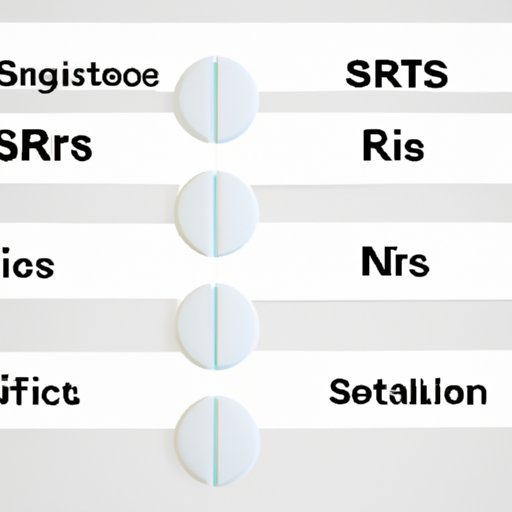Introduction
Selective serotonin reuptake inhibitors (SSRIs) are a class of medications commonly used to treat depression and other mental health conditions. They work by increasing the amount of serotonin, a neurotransmitter that plays an important role in regulating mood and emotions, in the brain. In this article, we’ll explore how SSRIs work, their advantages and disadvantages, and how they interact with neurotransmitters.

Exploring the Science Behind SSRIs
How SSRIs Work in the Brain
Serotonin is one of many neurotransmitters in the brain. Neurotransmitters are chemicals that carry information between nerve cells, or neurons. When serotonin is released into the synapse, which is the gap between neurons, it binds to receptors on the receiving neuron and transmits its signal. After it has been released, serotonin is then taken back up into the sending neuron, a process known as reuptake.
SSRIs work by blocking the reuptake of serotonin, which increases the amount of serotonin available in the synapse. This can have an antidepressant effect, as increased levels of serotonin are associated with improved mood and decreased anxiety. According to a study published in Nature Reviews Drug Discovery, “It is thought that by increasing extracellular levels of serotonin, SSRIs facilitate serotonergic transmission and improve symptoms of depression.”
Role of SSRIs in Mental Health
Depression is a serious mental illness that affects millions of people worldwide. It is characterized by persistent feelings of sadness, loss of interest, changes in appetite and sleep patterns, and difficulty concentrating. According to the World Health Organization, depression is the leading cause of disability worldwide.
SSRIs are often the first line of treatment for depression. They are effective in treating the symptoms of depression, such as low mood, lack of energy, and trouble concentrating. They are also used to treat other mental health conditions, such as anxiety disorders, obsessive-compulsive disorder, and post-traumatic stress disorder.

Examining the Benefits and Risks of Taking SSRIs
Advantages of SSRIs
SSRIs are generally well tolerated and have fewer side effects than other types of antidepressants. They are also less likely to cause weight gain, sexual dysfunction, and drowsiness than other antidepressants. Additionally, SSRIs have fewer drug-drug interactions than other antidepressants, meaning they can be taken safely with other medications.
SSRIs are also relatively easy to stop taking. Unlike some other antidepressants, they don’t require tapering off or gradual dose reductions. Most people can stop taking them without any significant withdrawal symptoms.
Potential Side Effects
Although SSRIs are generally well tolerated, they can cause some side effects. Common side effects include nausea, headache, insomnia, dry mouth, and drowsiness. These side effects usually go away after a few weeks of taking the medication.
Less common but more serious side effects of SSRIs include suicidal thoughts, mania, and abnormal bleeding. People taking SSRIs should be monitored closely for these side effects, especially in the first few weeks of treatment.
Understanding How SSRIs Interact with Neurotransmitters
Mechanism of Action
As mentioned earlier, SSRIs work by blocking the reuptake of serotonin. This increases the amount of serotonin available in the synapse, which can lead to an antidepressant effect. It also prevents serotonin from being reabsorbed by the sending neuron, which increases its activity in the brain.
In addition to blocking the reuptake of serotonin, SSRIs also block the reuptake of other neurotransmitters, such as norepinephrine and dopamine. This can have an antidepressant effect, as increased levels of these neurotransmitters are associated with improved mood.
Effect on Neurotransmitters
SSRIs can also affect other neurotransmitters in the brain. For example, they can increase levels of glutamate, an excitatory neurotransmitter, and decrease levels of gamma-aminobutyric acid (GABA), an inhibitory neurotransmitter. This can lead to an antidepressant effect, as increased levels of glutamate and decreased levels of GABA are associated with improved mood.

Comparing Different Types of SSRIs and Their Effects
Common Types of SSRIs
There are several types of SSRIs available, including fluoxetine (Prozac), sertraline (Zoloft), paroxetine (Paxil), citalopram (Celexa), and escitalopram (Lexapro). Each type of SSRI works slightly differently and may have different side effects.
Adverse Reactions to Different Types of SSRIs
Different types of SSRIs can cause different side effects. For example, fluoxetine may cause nausea and insomnia, while paroxetine may cause weight gain and sexual dysfunction. It’s important to talk to your doctor about the potential side effects of each type of SSRI before starting treatment.
Conclusion
In conclusion, SSRIs are a class of medications commonly used to treat depression and other mental health conditions. They work by blocking the reuptake of serotonin, which increases the amount of serotonin available in the synapse and can have an antidepressant effect. SSRIs are generally well tolerated and have fewer side effects than other types of antidepressants, but they can still cause some side effects. Additionally, different types of SSRIs can cause different side effects. It’s important to talk to your doctor about the potential benefits and risks of taking SSRIs before starting treatment.
By understanding how SSRIs work and their potential benefits and risks, you can make an informed decision about whether they are right for you.
(Note: Is this article not meeting your expectations? Do you have knowledge or insights to share? Unlock new opportunities and expand your reach by joining our authors team. Click Registration to join us and share your expertise with our readers.)
